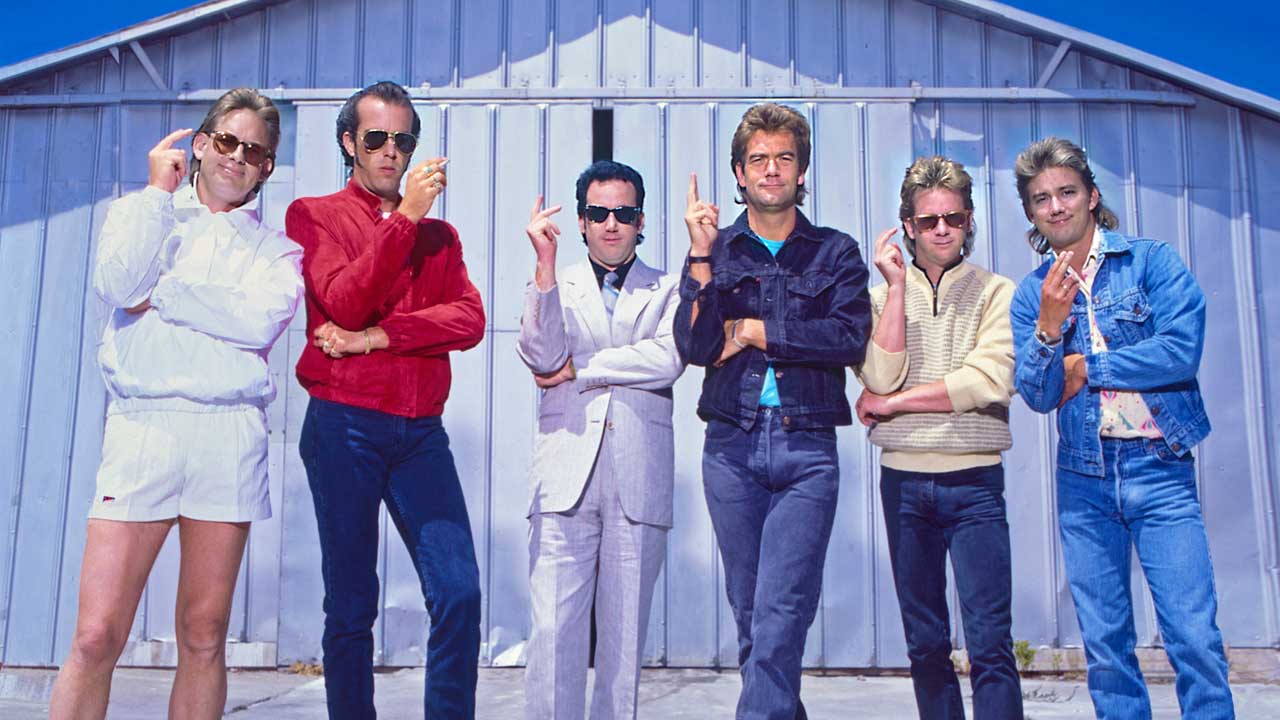In early 1985, an unlikely gathering of men sat down to a lunch meeting in a Hollywood restaurant. On one side of the table was director Steven Spielberg, already a Tinseltown legend for his work with great white sharks, extra-terrestrials and lost arks, and at the meeting in his capacity as executive producer. Flanking Spielberg were Robert Zemeckis and Bob Gale, respectively the director and scriptwriter of the screwball time-travel flick that they were there to talk about.
Across the table, a 30-something rock star shifted uncomfortably in his seat. Huey Lewis had already proved himself with a series of honest-to-goodness rock albums [backed by his band The News], but he had never written for a Hollywood movie before. Yet there was a specific reason why Spielberg had asked him to soundtrack this one.
“We were playing in LA when Spielberg requested the meeting,” Lewis recalls. “So we had lunch, and they said they’d written a movie called Back To The Future, and decided their hero Marty McFly’s favourite band would have been Huey Lewis & The News, so how would we like to write a song for the film? Spielberg didn’t give us a brief, and I didn’t know how to write songs for films. But I said we’d send him the next thing we wrote. Which we did.”
Armed with only a sketchy knowledge of the film’s plot – it followed the antics of Michael J Fox as a time-travelling teenager – Lewis set to work with News guitarist Chris Hayes.
“Chris wrote the progression and gave it to me on tape,” Lewis remembers. “In those egalitarian message (‘Don’t need money/Don’t take fame/Don’t need a credit card to ride this train’) was somewhat contrary to the yuppie audience who later adopted Huey Lewis as the soundtrack to the cheese course. The song was the perfect backdrop to Back To The Future’s relentless optimism. And Spielberg was impressed.
“I knew it was a good song, but I didn’t actually think it was going to work for him because it had nothing to do with the movie, ostensibly,” Lewis confesses. “It was actually a love song, and Marty McFly had no love interest to speak of. That wasn’t what the movie was about.
“But they loved it. When I sent the demo, they called back immediately to say it was fabulous. When we actually finished and mixed it, they flew up to see us – I think it was Zemeckis, Michael J Fox and a small entourage.”
As it turned out, Zemeckis liked The Power Of Love so much that he insisted it should be the song Marty McFly’s school band played during an audition scene in the film, and that Lewis himself play a cameo as a teacher who fails them for being ‘too loud’.
“I was reluctant,” says Lewis of the scene, “because I thought it was a kids’ movie. And we were quite popular at the time – we’d had a bunch of hits – so I had no desire to do it. But Zemeckis talked me into it. We agreed I’d do a cameo if I was disguised and uncredited. So they made this part up for me, and we filmed it in a matter of hours at a high-school gym.
“It’s funny, because in the movie, the bit where he’s [Fox/McFly] playing is actually a copy of our original demo – just with a kinda off-the-wall guitar solo thrown over it, to mess it up a bit. That’s the backing track Marty mimes to before I stop him and tell him it’s too loud. Michael J Fox is a good guitarist, though.”
Released some weeks before the film, The Power Of Love topped the US chart in August 1985. That should have lined Lewis’s pockets, but due to the singer signing a deal that agreed a flat rate for the song, he never cashed in on its popularity.
“I didn’t get paid much,” Lewis says. “The sad part is that in the UK, The Power Of Love was on a Huey Lewis & The News record, but in America it wasn’t allowed to be. We sold it to them. And I don’t know if it was for $100,000. Maybe it was even less.
"Then they put together a Back To The Future soundtrack album that The Power Of Love was on – there were only two or three songs on it, and the rest was source music. It was a very lousy album; I think it sold 500,000 copies. So we actually never made any huge money from the song. But it didn’t bother me. We didn’t do it for the money. But it’s interesting to note that the business aspects of these things are really what matter. “I still love the song,”
Lewis says. “We still play it regularly, although most of our shows are in America, where we’ve had plenty of hits, so we don’t have to play it every night. That’s the thing – if you don’t work too much, this is the best job in the world. And as long as you don’t play The Power Of Love too much it’s the best song in the world. Or one of them, anyway.”
Back To The Future: The Musical is currently running at London’s Adelphi Theatre.

